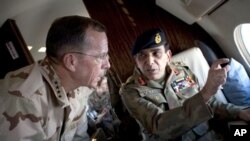The top U.S. military officer told Indian leaders Friday the United States will continue to sell weapons to Pakistan, and that the sales do not pose a threat to India. on the visit by the Chairman of the Joint Chiefs of Staff, Admiral Mike Mullen.
Admiral Mullen says he is confident the weapons the United States is selling to Pakistan are being used for their intended purpose - to fight al-Qaida and related terrorist organizations. But he says he urged Indian leaders to continue to discuss their concerns with him and other U.S. officials.
"We certainly understand the concerns and at the same time I don't believe that we've sold any weapons to Pakistan which greatly imbalance the capability between the two countries."
The admiral said the United States does not monitor the exact location or use of each item it sells to Pakistan, but his confidence they are being used properly is based on the increased trust between the U.S. and Pakistani governments built up in recent years.
U.S. officials also noted that the United States has sold sophisticated weapons to India, and is working on more sales, possibly including fighter jets.
Admiral Mullen praised recent improvements in U.S.-Indian relations, including an agreement signed Friday by the American ambassador and India's Home Minister to create a Counterterrorism Cooperation Initiative. The initiative includes a plan for cooperation on cyber security, which Admiral Mullen cited as a key area for U.S.-Indian cooperation.
The admiral welcomed the recent India-Pakistan dialogue, but said he was "discouraged" when the talks broke down. And he said he shares concerns about the activities of Pakistan's intelligence service, the ISI, which has been accused of supporting terrorist groups including the Haqqani network in Afghanistan and Lashkar-e-Taiba, which carried out the Mumbai attacks in 2008. Mullen says the ISI needs to "fundamentally change" its strategic approach.
"The ISI is an organization that has operated within Pakistan in concert with what it believes are its own national interests. And at the same time, there's an awful lot about them that I don't know."
The admiral said some elements of the ISI clearly operate on orders from the Pakistani government, but he could not say whether all the group's activities are under the government's control.
Admiral Mullen said he expresses his concerns about ISI to Pakistani leaders on a regular basis, and he will do so again when he meets them later in this trip through the region.





